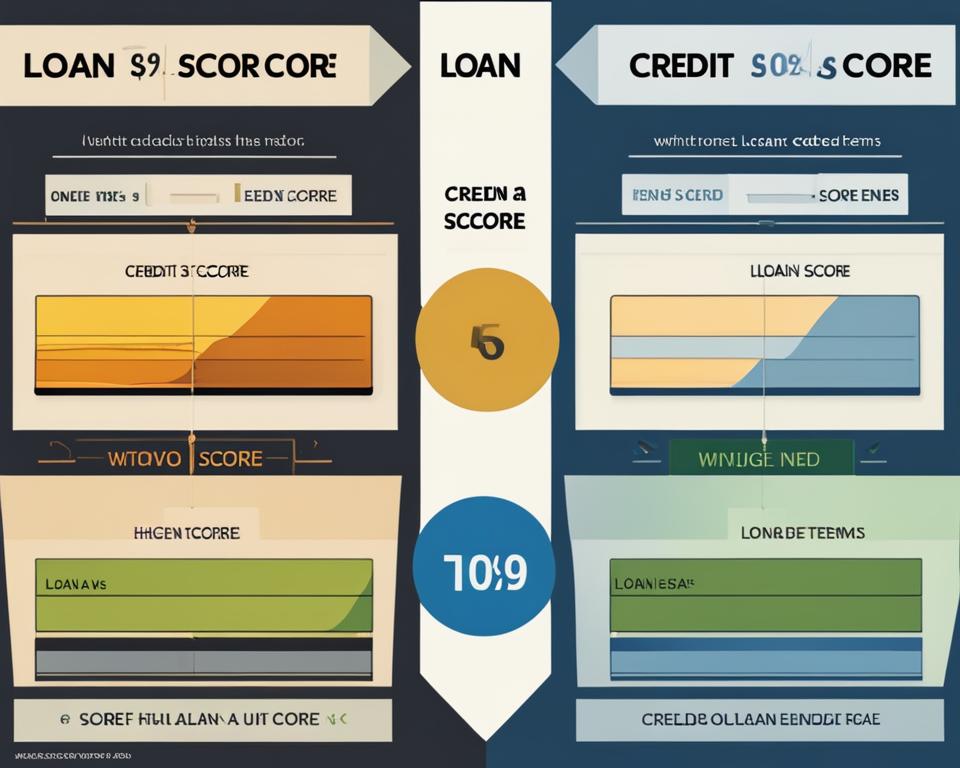When it comes to borrowing money, your credit score plays a crucial role in determining the terms of your loan. Lenders use your credit score to assess your creditworthiness and decide whether to approve your loan application. But how exactly does your credit score impact loan terms? Let’s explore.
A higher credit score can lead to lower interest rates, making borrowing more affordable. On the contrary, a lower credit score might result in higher interest rates, meaning you’ll pay more over time. Understanding the relationship between your credit score and loan terms is essential for making informed borrowing decisions.
Having a good credit score not only improves your chances of loan approval but also opens the door to more favorable loan terms. Lenders view borrowers with higher credit scores as less risky, allowing them to offer lower interest rates and more flexible repayment options. On the other hand, borrowers with lower credit scores might face stricter terms and higher interest rates.
So, how can you improve your credit score to secure better loan terms? By making all your payments on time, reducing your credit utilization, and maintaining a positive credit history, you can boost your creditworthiness. Additionally, diversifying your credit accounts and avoiding excessive new credit applications can contribute to a higher credit score.
Remember, your credit score reflects your borrowing habits and financial responsibility. By understanding how your credit score affects loan terms and taking steps to improve it, you can position yourself for better borrowing options and financial success.
Key Takeaways:
- A higher credit score can lead to lower interest rates on loans.
- A lower credit score may result in higher interest rates.
- Lenders view borrowers with higher credit scores as less risky.
- Improving your credit score can increase your chances of loan approval.
- Responsible credit management is the key to better loan terms and financial success.
The Importance of Credit Scores in Loan Applications
When applying for a loan, your credit score plays a crucial role in the decision-making process for lenders. It serves as an important indicator of your ability to repay the loan on time. Different lenders may have varying credit score requirements, but generally, a higher credit score improves your chances of loan approval. Understanding how credit scores impact loan applications is essential to navigate the borrowing process successfully.
Lenders rely on credit scores to assess the level of risk associated with lending money to borrowers. Your credit score provides a snapshot of your creditworthiness and financial stability. A higher credit score indicates responsible credit management and demonstrates your ability to repay debts. This makes you a more attractive candidate for lenders.
So, what is the credit score range for loans? Credit scores typically range from approximately 300 to 850, with higher scores indicating better creditworthiness. The specific credit score requirements may vary depending on the type of loan and the lender’s policies. However, having a higher credit score gives you a better chance of meeting the credit score requirements for loans and securing the financing you need.
Loan approval based on credit score
“I wouldn’t have been able to secure a loan without my high credit score. It gave the lender the confidence to approve my application and offer a competitive interest rate.” – John Smith, a recent loan recipient.
A higher credit score not only increases your chances of loan approval but also opens doors to better terms and interest rates. Lenders view borrowers with higher credit scores as less risky, making them more inclined to offer lower interest rates. This can save you thousands of dollars over the life of your loan.
Table: Loan Eligibility Based on Credit Score
| Credit Score Range | Loan Eligibility | Interest Rates |
|---|---|---|
| Excellent (800+) | Highly Eligible | Lowest Rates |
| Very Good (740-799) | Strong Eligibility | Favorable Rates |
| Good (670-739) | Good Eligibility | Moderate Rates |
| Fair (580-669) | Limited Eligibility | Higher Rates |
| Poor (579 or below) | Low Eligibility | High Rates |
Improving your credit score can significantly enhance your loan eligibility and provide access to better loan options. By maintaining a good payment history, reducing credit utilization, and managing your credit responsibly, you can gradually increase your credit score over time.
In the next section, we’ll delve deeper into how credit scores impact loan interest rates and the factors that influence your credit score in loan applications.
Credit Score and Loan Interest Rates
A higher credit score can have a significant impact on the interest rates you are offered when applying for a loan. Lenders consider borrowers with higher credit scores to be less of a risk, allowing them to provide more favorable loan terms. On the other hand, if you have a lower credit score, you may face higher interest rates.
Several factors contribute to your credit score, and they can influence the interest rates you receive. Consider these important factors when managing your credit and applying for loans:
- Payment History: Paying your bills on time and in full demonstrates reliability and can positively impact your credit score.
- Amounts Owed: The amount you owe compared to your credit limits can affect your credit score. Lowering your credit utilization ratio by reducing your debts can improve your score.
- Length of Credit History: Having a longer credit history can show lenders your ability to manage credit responsibly over time and may lead to lower interest rates.
- Type of Credit: A diverse mix of credit types, such as credit cards, loans, and mortgages, can contribute positively to your credit score.
- New Credit Inquiries: Opening several new credit accounts within a short period can temporarily lower your credit score. Limit new credit applications before applying for a loan.
It’s essential to understand that these factors can vary in importance depending on individual lenders and their specific loan programs. By maintaining a good credit score and managing these factors, you can increase your chances of securing loans with lower interest rates and more favorable terms.
Join me in the next section as we explore effective strategies for improving your credit score to enhance your loan options.
Improving Your Credit Score for Loan Eligibility
Improving your credit score is essential for increasing your eligibility for loans and securing better terms. By taking proactive steps to improve your creditworthiness, you can enhance your chances of loan approval and enjoy more favorable interest rates. Here are some strategies to help you improve your credit score:
- Make all your payments on time: Late payments can negatively impact your credit score. Ensure that you meet your payment obligations by setting up reminders or automatic payments.
- Reduce your credit utilization: Aim to keep your credit card balances low compared to your total credit limit. Ideally, keep your credit utilization below 30% to demonstrate responsible credit management.
- Maintain a long credit history: Creditors appreciate borrowers with a lengthy credit history. Avoid closing old credit accounts and focus on building a strong credit history over time.
- Diversify your credit accounts: Having a mix of credit types, such as credit cards, loans, and a mortgage, shows that you can handle different types of credit responsibly. However, don’t open new credit accounts just for the sake of diversity.
- Avoid excessive new credit applications: Applying for multiple new credit accounts within a short period can negatively impact your credit score. Instead, be selective and apply for credit only when necessary.
Regularly monitoring your credit report is crucial for identifying any errors or discrepancies that could be dragging down your score. If you find any inaccuracies, notify the credit reporting agencies to have them corrected. Additionally, consistent effort and patience will yield results over time, so stay focused on implementing these credit improvement strategies.
“Improving your credit score is like building a solid foundation for your financial future. It opens doors to better loan options and demonstrates your creditworthiness to potential lenders.”
Remember, an improved credit score not only increases your chances of loan approval but also puts you in a stronger position to negotiate favorable terms. Take control of your credit and watch as your loan eligibility improves along with your financial well-being.
| Benefits of Improving Your Credit Score | Actions to Improve Your Credit Score |
|---|---|
|
|
Understanding Credit Score and Loan Approval
When applying for a loan, lenders carefully evaluate your credit score as part of the approval process. Your credit score provides lenders with valuable insight into your creditworthiness and plays a significant role in their decision to approve or deny your loan application. Lenders use your credit score to assess the level of risk associated with lending you money and to determine whether you are likely to repay the loan.
A higher credit score is generally seen as an indicator of responsible financial behavior and may increase your chances of loan approval. On the other hand, a lower credit score can make it more challenging to secure a loan, as lenders may view you as a higher credit risk.
Meeting the credit score range required by the lender is crucial for increasing your chances of loan approval. Lenders typically have specific credit score requirements that borrowers must meet to be considered eligible for a loan. Understanding the credit score range desired by lenders can help you determine if you meet the necessary criteria and increase your likelihood of being approved.
Improving your credit score is one key way to enhance your loan eligibility. By implementing responsible credit management practices, such as making timely payments, reducing your overall debt, and maintaining a healthy credit utilization ratio, you can gradually raise your credit score. Regularly monitoring your credit report and addressing any errors can also contribute to improving your credit score and increasing your chances of loan approval.
“Your credit score serves as an important indicator of your creditworthiness and greatly influences your chances of being approved for a loan. Understanding the credit score range desired by lenders and taking steps to improve your credit score are essential for increasing your loan eligibility and securing favorable loan terms.”
Factors Affecting Credit Scores in Loan Applications
| Factors | Description |
|---|---|
| Payment History | Timely payments demonstrate financial responsibility and positively impact your credit score. |
| Credit Utilization | The proportion of your available credit that you are currently using affects your credit score. Maintaining a low credit utilization ratio can improve your credit score. |
| Length of Credit History | A longer credit history generally increases your credit score as it provides more information on your financial track record. |
| Types of Credit | Having diverse credit accounts, such as credit cards, mortgage loans, and auto loans, can positively impact your credit score. |
| New Credit Inquiries | Multiple recent credit inquiries can temporarily lower your credit score, so be mindful of applying for new credit too frequently. |
Understanding the factors that affect your credit score when applying for a loan can help you make informed decisions and take appropriate steps to improve your creditworthiness. By focusing on improving your credit score and meeting the credit score range required by lenders, you can enhance your loan eligibility and increase your chances of loan approval.

Factors Affecting Credit Scores in Loan Applications
When applying for a loan, there are several factors that can influence your credit score. Understanding these factors is key to improving your creditworthiness and increasing your chances of loan approval.
Payment History
One of the most significant factors affecting your credit score is your payment history. Lenders want to see a consistent pattern of on-time payments. Late payments, defaults, or accounts in collections can negatively impact your credit score and signal to lenders that you may be a higher risk borrower.
Credit Utilization
Credit utilization refers to the percentage of your available credit that you are currently using. High levels of credit utilization can indicate financial strain and may lower your credit score. It’s generally recommended to keep your credit utilization below 30% to maintain a healthy credit score.
Length of Credit History
The length of your credit history also plays a role in determining your credit score. Lenders prefer to see a longer credit history as it provides more data to assess your creditworthiness. If you’re new to credit, it’s important to start building a positive credit history as early as possible.
Types of Credit
Having a diverse mix of credit accounts can positively impact your credit score. Lenders want to see that you can manage different types of credit responsibly, such as credit cards, loans, and mortgages. However, it’s important to only take on credit that you can comfortably manage.
New Credit Inquiries
Each time you apply for new credit, a hard inquiry is placed on your credit report. Multiple inquiries within a short period of time can be seen as a red flag to lenders, as it may indicate financial instability or desperation. It’s important to be mindful of how often you apply for new credit to avoid negatively affecting your credit score.
“Understanding the factors that affect your credit score is essential for improving your creditworthiness and increasing your chances of loan approval.”
By maintaining a positive payment history, keeping credit utilization low, and managing your credit responsibly, you can work towards improving your credit score. Doing so will not only increase your chances of loan approval but also enable you to secure better loan terms and lower interest rates.
| Factors Affecting Credit Scores | Impact |
|---|---|
| Payment History | High impact |
| Credit Utilization | Moderate impact |
| Length of Credit History | Moderate impact |
| Types of Credit | Moderate impact |
| New Credit Inquiries | Low impact |
Understanding these factors and taking proactive measures to improve your credit score can open doors to better loan opportunities and financial stability.
Understanding Credit Scoring Systems
When it comes to evaluating credit risk, lenders rely on credit scoring systems such as the FICO score. The FICO score is widely used by the three major credit bureaus – Equifax, TransUnion, and Experian. However, it’s important to note that each credit bureau may have its own proprietary scoring system. These variations arise from differences in how lenders report information to each bureau.
Understanding the credit scoring system utilized by a particular lender is crucial when assessing your creditworthiness. Having knowledge of which credit bureau’s scoring model is used can help you make informed decisions and improve your credit score.
How Credit Scoring Systems Work
Credit scoring systems analyze various factors from your credit history and generate a score that reflects your creditworthiness. These factors can include:
- Payment history: Timely payments positively impact your credit score.
- Credit utilization: Keeping credit utilization low shows responsible credit management.
- Length of credit history: A longer credit history demonstrates stability.
- Types of credit: Having a mix of credit accounts, such as credit cards and loans, can boost your score.
- New credit inquiries: Frequent applications for new credit can negatively affect your score.
By evaluating these factors, credit scoring systems determine your creditworthiness and assign you a credit score. This score becomes a key consideration for lenders when determining loan eligibility and interest rates.
Comparing Credit Scoring Systems
| Credit Scoring System | Credit Bureau | Advantages | Disadvantages |
|---|---|---|---|
| FICO Score | Equifax, TransUnion, Experian | Widely recognized and used by many lenders | Variations in scoring systems among credit bureaus |
| Other Proprietary Scoring Systems | Specific Credit Bureaus | Reflect lender-specific risk assessments | Less standardized and recognized by lenders |
It’s worth noting that while the FICO score is commonly used, some lenders may use different proprietary scoring models based on their risk assessment preferences. These scoring models may have their own advantages and disadvantages.
When applying for a loan, it’s beneficial to be aware of the credit scoring system utilized by the lender. This knowledge helps you understand how your creditworthiness is evaluated and allows you to take appropriate steps to improve your credit score.
The Impact of Your Credit Score on Mortgage Loans
Your credit score plays a significant role in determining the terms of your mortgage loan. Lenders take into account your credit score when deciding on your mortgage interest rates, which directly affects your monthly payments. As a general rule, borrowers with higher credit scores are offered lower interest rates, resulting in more affordable loans.
Conversely, borrowers with lower credit scores may be subjected to higher interest rates, increasing the overall cost of their mortgage loans over time. This is because lenders perceive these individuals as higher-risk borrowers who may be more likely to default on their payments.
By improving your credit score before applying for a mortgage, you can potentially save thousands of dollars in interest payments. Even a slight increase in your credit score can make a significant difference in the interest rate offered by lenders. This not only reduces your monthly mortgage payments but also saves you money in the long run.
To improve your credit score, focus on key factors that impact it, such as:
- Timely payment of bills and debts
- Reducing your overall debt-to-credit ratio
- Having a diverse mix of credit accounts (e.g., credit cards, loans, etc.)
- Keeping the length of your credit history in mind
- Avoiding excessive new credit applications
Remember, your credit score is not the sole determining factor when applying for a mortgage loan, but it does play a crucial role in the interest rates and terms you are offered. Taking proactive steps to improve your credit score can provide you with more favorable loan options and help you achieve your homeownership goals.
The Importance of Monitoring Your Credit Score
Regularly monitoring your credit score is essential to stay aware of your financial standing and track any changes that may impact your ability to secure a mortgage loan. By checking your credit report, you can identify errors or inaccuracies and take steps to address them promptly. Additionally, monitoring your credit allows you to see the progress of your credit score as you implement positive financial habits.
Now, let’s take a look at a table that depicts the potential impact of credit scores on mortgage interest rates:
| Credit Score Range | Mortgage Interest Rate |
|---|---|
| Excellent (760+) | Approximately 2.5%-3% |
| Good (700-759) | Approximately 3.5%-4% |
| Fair (640-699) | Approximately 4.5%-5% |
| Poor (639 or below) | Approximately 5.5% or higher |
This table demonstrates the potential variation in mortgage interest rates based on different credit score ranges. As you can see, even a small difference in credit score can result in a significant shift in interest rates, further emphasizing the importance of maintaining a good credit score.
By understanding the impact of your credit score on mortgage loans and taking proactive steps to improve it, you can secure more favorable loan terms and potentially save thousands of dollars over the life of your mortgage.
Conclusion
Your credit score is a key factor in determining your loan terms and eligibility. Having a higher credit score can open doors to better loan options, including lower interest rates, while a lower credit score can make it more challenging to secure favorable terms. Therefore, it’s crucial to understand and actively work on improving your credit score.
By practicing responsible credit management, such as making timely payments and keeping your credit utilization low, you can boost your credit score over time. Regularly monitoring your credit report for errors and discrepancies allows you to address them promptly, further enhancing your creditworthiness.
Improving your credit score not only increases your chances of loan approval but also saves you money in the long run. With a higher credit score, you’ll have access to better loan options, potentially reducing your monthly payments and saving on interest costs throughout the life of the loan.
Remember, building and maintaining a strong credit score is an ongoing process. By taking proactive measures to manage your credit responsibly, you can achieve your financial goals and secure the loan terms that best suit your needs.
FAQ
How does my credit score affect loan terms?
Your credit score plays a significant role in determining the terms of your loan. Lenders use your credit score to assess your creditworthiness and decide whether to approve your loan application. A higher credit score can lead to lower interest rates, while a lower credit score can result in higher interest rates.
What is the importance of credit scores in loan applications?
Credit scores are essential in loan applications as they help lenders evaluate your creditworthiness. Different lenders may have varying credit score requirements, but generally, a higher credit score improves your chances of loan approval.
How does your credit score impact loan interest rates?
A higher credit score can lead to lower interest rates on loans, while a lower credit score may result in higher interest rates. Lenders view borrowers with higher credit scores as less of a risk, allowing them to offer more favorable loan terms. Factors such as payment history, amounts owed, length of credit history, type of credit, and new credit inquiries all contribute to your credit score and can impact the interest rates you are offered.
How can I improve my credit score for loan eligibility?
To improve your credit score, focus on making all your payments on time, reducing your credit utilization, maintaining a long credit history, diversifying your credit accounts, and avoiding excessive new credit applications. Regularly monitoring your credit report and addressing any errors or discrepancies can also help improve your score.
How does my credit score impact loan approval?
When applying for a loan, lenders assess your credit score as part of the approval process. Meeting the credit score range required by the lender increases your chances of loan approval. Several factors influence your credit score when applying for a loan, including payment history, credit utilization, length of credit history, types of credit, and new credit inquiries.
What factors affect credit scores in loan applications?
Payment history, credit utilization, length of credit history, types of credit, and new credit inquiries all impact your credit score when applying for a loan. Maintaining a positive payment history, keeping credit utilization low, and managing your credit responsibly can help improve your credit score and increase your chances of loan approval.
What should I know about credit scoring systems?
Credit scoring systems, such as the FICO score, are used by lenders to assess credit risk. The three major credit bureaus, Equifax, TransUnion, and Experian, use the FICO scoring model. However, each credit bureau may have its own proprietary scoring system due to differences in how lenders report information. It’s important to understand which credit bureau’s scoring system a lender uses when evaluating your credit score.
How does my credit score impact mortgage loans?
Your credit score significantly impacts the terms of mortgage loans. Lenders offer lower mortgage interest rates to borrowers with higher credit scores, resulting in lower monthly payments. Conversely, borrowers with lower credit scores may face higher interest rates and ultimately pay more over the life of the loan. Improving your credit score before applying for a mortgage can save you thousands of dollars in interest payments.
What is the conclusion regarding credit score impact on loans?
Your credit score has a significant impact on loan terms and eligibility. With a higher credit score, you can qualify for better loan terms, including lower interest rates. Improving your credit score through responsible credit management can increase your chances of loan approval and save you money in the long run. Regularly monitoring your credit and taking steps to improve your credit score can help you achieve your financial goals.





